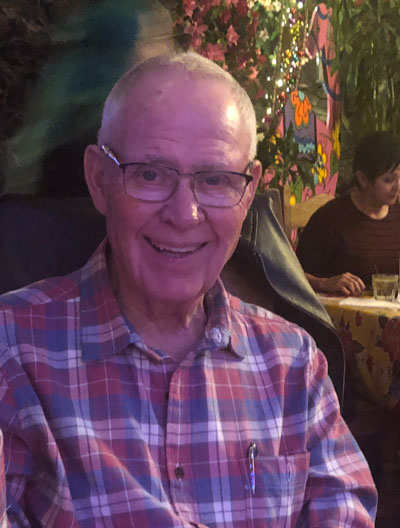
WAYNE MULLIS
Wayne Finds The Right Care After Pancreatic Cancer Diagnosis
Written By Debra Gelbart
Diagnosis: September 2018
Status: No Signs of Active Cancer
Wayne Mullis of Scottsdale has been told he doesn’t have evidence of cancer
—anymore.
But he did, in September of 2018. At the end of the summer that year, Wayne started experiencing an upset stomach and other digestive challenges that persisted enough for him to go to his primary care physician for an evaluation in September of that year. Wayne suspected he might have irritable bowel syndrome, but his doctor thought something more serious may be going on. He sent Wayne to a gastroenterologist for further testing.
An endoscopy (where a special scope views the digestive system) led the doctor to conclude that Wayne had pancreatic cancer. He was then referred to Erkut Borazanci, M.D. at HonorHealth Research Institute in Scottsdale. Wayne said he asked Borazanci, “’Am I too late to the party to be helped?’ To my surprise, the answer was ‘no, you are not too late.’” Dr. Borazanci then entered him into a clinical trial and presented a treatment plan
Specific Treatment in Advance of Surgery
Wayne was told he would be treated with chemotherapy and possibly radiation as what’s called “neoadjuvant” therapy—a precursor to surgery intended to shrink the tumor as much as possible to help the surgery be more successful. Wayne was first treated with a chemotherapy combination of gemcitabine, cisplatin, nab-paclitaxel and paricalcitrol (Vitamin D) and then treated with stereotactic body radiation therapy during the months of September, October, November in the first part of December of 2018.
“I was told the tumor was shrinking,” he said. Albert Amini, M.D., his surgeon, scheduled him for Whipple surgery on January 4, 2019. Wayne spent eight days in the hospital, but the surgery was deemed a success. “I was told it was the best possible result—that the pathology was excellent,” Wayne said. “The doctors told me, ‘you don’t have any signs of active cancer.”” Since January of 2019, he goes to HonorHealth every two months for a checkup and a scan. So far, there has been no evidence of disease.
Read More About The Clinical Trial
Connecting With The Seena Magowitz Foundation
He’s grateful for that and for getting connected to the Seena Magowitz Foundation. He said he thoroughly enjoyed the weekend activities that were part of the Foundation’s annual fundraising event Nov. 1-3, 2019. “I wasn’t sure I would be able t attend,” Wayne said, “because I was scheduled for another surgery for a hernia—a common effect of the Whipple surgery—just four days before the event.” But that surgery was postponed until Nov. 12, when his hernia was successfully repaired.
Before he underwent the Whipple Procedure, he was able to enjoy the Foundation’s Annual Golf Classic. “I thought it was inspiring to hear about other people’s experiences,” he said. “And I appreciated learning about the Magowitz Foundation, because what they’re doing is of great benefit to pancreatic cancer patients.”
Words of Wisdom
As for how he would advise others facing a potentially devastating diagnosis: “find the right care from someone who really cares. I can’t say enough about the Virginia Piper Cancer Center at HonorHealth and the HonorHealth Research Institute. They are absolutely terrific. Getting the right care at the right place when you’re faced with a situation like mine is extraordinary.”
He said he realizes that each patient is different and responds differently. “But I know I’ve benefited from the work of my entire treatment team. I cannot say enough good things about Dr. Borazanci and Dr. Amini and their staffs. I consider myself very fortunate to have had an opportunity to have these professionals on my survival team.”




So happy you are better. How old are you?